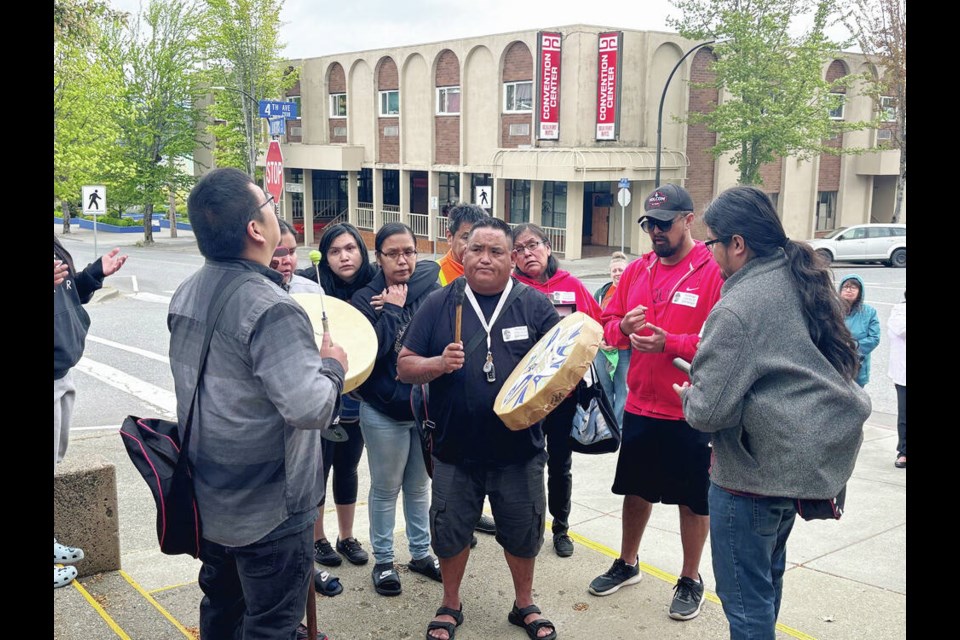PORT ALBERNI — A Port Alberni mother and her partner have both been sentenced to 15 years in prison for brutalizing and killing her six-year-old son in March 2018.
Dontay Patrick Lucas died on March 13, 2018, of blunt force trauma to the brain after being transitioned back into the care of his mother, Rykel Charleson, by USMA Nuu-chah-nulth family and child services.
His death has illuminated systemic issues in B.C.’s Indigenous child welfare system, prompting a promise from Premier David Eby to provide answers about the boy’s horrific death to prevent similar child deaths in the future.
Charleson — who has legally changed her name to Hannah Frank — and stepfather Mitchell Frank were originally charged with first-degree murder, but in November, they pleaded guilty to manslaughter.
The couple abused Dontay, biting him, hitting him and making him hang by his knees from the top of a door.
They deprived him of sleep, food and water, said Justice Michael Tammen, who accepted a joint submission from the Crown and defence for the 15-year sentence.
“The death of any child is tragic on a grand scale, more so when the death is caused by unlawful homicide, more so still when the perpetrators are parents, those in trust with the caring for and nurturing of the child,” Tammen said on Thursday at the couple’s sentencing hearing in B.C. Supreme Court in Port Alberni.
“Clearly, both accused caused Dontay’s death by committing wanton acts of cruelty. It is unfathomable they would engage in such behaviour with a defenceless child.”
The couple, who have no previous criminal record, have been in custody since May 2022. With almost three years credit for pretrial custody, they will serve close to 12 years in a federal prison.
Dontay’s relatives — including his father, Patrick Lucas, and grandmother Judy Campbell — his former foster mothers and grieving members of the community gathered outside the courthouse at a rally before the hearing, drumming and singing and drawing attention to the family’s fight for an inquiry into Dontay’s death.
Later in the courtroom, many held framed photographs of the young boy and carried cleansing cedar boughs.
People cried and wiped away tears as Crown prosecutor Kimberly Henders Miller read victim impact statements. Former foster mother Laurie Kochan wrote that she told Dontay he was going to be OK when he left her care.
“I wish I had done more to protect him. I failed,” she wrote. “I think about this every day.”
Foster mother Susan Toth is caring for Dontay’s sisters, Mia, 13, and Lily, 7. Toth said Mia found it too painful to write a victim impact statement. Lily, who was a baby when Dontay died, drew a picture of herself playing with Dontay and Mia in the sunshine. The drawing was called My Wish.
“Dontay, I am sad. I do not remember you. That makes me sad. I wish you were here,” wrote Lily.
Patrick Lucas described his depression and isolation from friends and family since the death of his son.
The court also watched a video of Dontay, in a bright yellow T-shirt, doing a dance with his cousin at the Friendship Centre.
In March 2018, the Franks were living with Mia, 7, Dontay, 6, Lily, nine months and Hannah Frank’s sister Nessa, aged nine.
Defence lawyer Ben Lynskey said Hannah Frank was in a “position of desperation” when Dontay was being transitioned back into her care.
“She was not doing well in terms of her mental health, parenting four children,” he said.
On the night Dontay died, the couple had run out of formula for Lily, who had not eaten or slept for 18 hours. Two people with limited parenting skills were under a great deal of stress, said Lynskey.
Both accused apologized to their families. Lynskey read a note of apology to Hannah’s family, the community and her three daughters.
“I was afraid to ask for help because I was hurting. I was afraid to let anyone know I wasn’t ready. Not asking for help was one of the biggest mistakes I ever made,” she wrote. “If I could change places with my son, I would. I’m sorry.”
Mitchell Frank stood and apologized to family members and members of the community.
“I loved him and think about him every day. If there was anyways to bring him back or undo what I have done, I would do [it] in a heartbeat,” he said.
Neither Dontay’s mother nor his stepfather was emotionally equipped to properly care for Dontay, said the judge, who cited “powerful Gladue factors” that affected both accused.
Hannah Frank’s mother, grandmother and maternal aunts and uncles are all survivors of the residential school system.
Hannah Frank was abandoned by her father before her birth and abandoned by her mother while still an infant.
She lived with her grandmother until age five, then was returned to her mother when her grandmother died.
Hannah was exposed to physical violence in the home and sexually abused. At 13, she ran away from home and became involved with an older man. She began drinking and developed a serious alcohol problem.
Mitchell Frank was raised in Ahousaht. Many of his relatives were survivors of the residential school system. His parents were alcoholics who neglected their children’s needs, said Tammen.
He began drinking at age 17 and met Hannah Frank when he was 22. At that time, Dontay and Mia were in foster care.
Tammen found it aggravating that the crime involving prolonged abuse and considerable violence against a vulnerable young person by two accused in a position of trust.
The judge accepted that both accused were remorseful. He found their guilty pleas mitigating.



